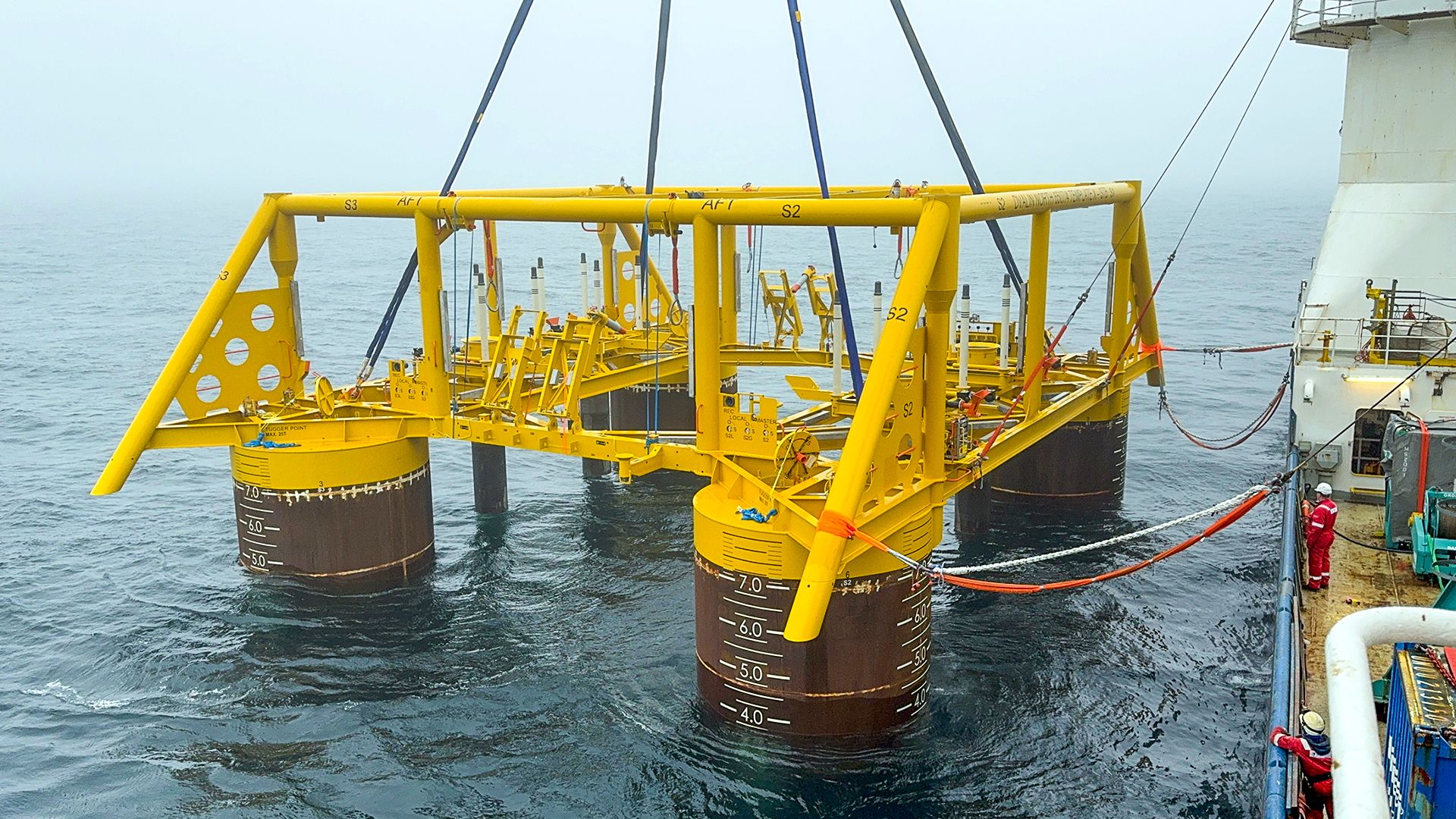Start of development drilling at the Fénix gas field off the coast of Argentina


- Drilling commenced at Fénix, which is the largest natural gas field under development offshore Argentina
- Project well on track for first gas end of 2024
- Fénix to contribute significant natural gas volumes for more than 15 years to Argentina’s energy supply
BUENOS AIRES / KASSEL / HAMBURG. Wintershall Dea and its partners Total Austral, subsidiary of TotalEnergies in Argentina (operator), and Pan American Energy have commenced development drilling at the Fénix field, around 60 kilometres off the coast of Tierra del Fuego.
Noble’s jack-up drilling rig Regina Allen has been deployed to start the Fénix development drilling programme. The rig is temporarily located next to the new Fénix production platform, installed beginning of the year. Three development wells are planned to be drilled, completed and put on production over the next months. Production is then planned to be evacuated via a 24-inch subsea multiphase line to the existing Vega Pléyade platform at 35 kilometres distance from Fénix, and from there to the Rio Cullen facilities at shore.
“After the successful installation of the production platform in February and extensive and detailed preparation work for the drilling campaign over recent months, we are delighted to commence the next stage in the development of Fénix. We are well on track to bring this key energy project into production in Q4 this year”, says Manfred Boeckmann, Managing Director of Wintershall Dea Argentina. “The team is looking forward to a successful drilling campaign”, he adds.
Fénix is the largest natural gas field currently being developed off the Argentine coast. Fénix represents a material pillar for the growing domestic gas production, with its natural gas volumes planned to contribute for more than 15 years to Argentina’s long-term energy supply. The gas field is expected to play a significant role in the country’s energy matrix and to offset imports, with a planned peak production of around 10 million cubic metres of gas per day. The total investment of the consortium in the Fénix development amounts to approximately 700 million US dollars.
Fénix is the next gas field to be brought on stream as part of the world’s southernmost gas production concession CMA-1 in which Wintershall Dea and Total Austral (operator) each hold a 37.5 per cent share while Pan American Energy holds the remaining 25 per cent. Currently, the four main gas fields Cañadón Alfa, Aries, Carina and Vega Pléyade in CMA-1 are producing and already supply 15 per cent of Argentina's natural gas production.
Wintershall Dea in Argentina
Wintershall Dea has been active in Argentina for 45 years. Today, the company has stakes in onshore and offshore fields in Neuquén and Tierra del Fuego and with these contributes significantly to Argentina’s energy supply. With a total production of about 60,000 barrels of oil equivalent per day, Wintershall Dea is one of Argentina’s main gas producers.
About Wintershall Dea
Wintershall Dea is a leading independent European gas and oil company with more than 120 years of experience as an operator and project partner along the entire E&P value chain. The company with German roots and headquarters in Kassel and Hamburg explores for and produces gas and oil in 11 countries worldwide in an efficient and responsible manner. With activities in Europe, Latin America and the MENA region (Middle East & North Africa), Wintershall Dea has a global upstream portfolio and, with its participation in natural gas transport, is also active in the midstream business. And we develop carbon management and low carbon hydrogen projects to contribute to climate goals and secure energy supplies. More in our Annual Report.
As a European gas and oil company, we support the EU's 2050 carbon neutrality target. As our contribution we have set ourselves ambitious targets: We want to be net zero across our entire upstream operations – both operated and non-operated – by 2030. This includes Scope 1 (direct) and Scope 2 (indirect) greenhouse gas emissions on an equity share basis. Wintershall Dea will also bring its methane emissions intensity below 0.1 per cent by 2025. We endorsed the World Bank’s Initiative ‘Zero Routine Flaring by 2030’ and continue to support the initiative aimed at eliminating routine flaring in operated assets by 2030. In addition, we plan to support global decarbonisation efforts by building up a carbon management and hydrogen business to potentially abate 20-30 million tonnes of CO2 per annum by 2040. You can find more about this in our Sustainability Report.
Wintershall Dea was formed from the merger of Wintershall Holding GmbH and DEA Deutsche Erdoel AG, in 2019. Today, the company employs more than 2,000 people worldwide from almost 60 nations.
The shareholders of Wintershall Dea (BASF and LetterOne) and Harbour Energy plc (Harbour) signed a business combination agreement in December 2023 to transfer Wintershall Dea’s E&P business consisting of its producing and development assets as well as exploration rights in Norway, Argentina, Germany, Mexico, Algeria, Libya (excluding Wintershall AG), Egypt and Denmark (excluding Ravn) as well as Wintershall Dea’s carbon capture and storage (CCS) licenses to Harbour. Until closing, Wintershall Dea and Harbour will continue to operate as independent companies. The transaction is, among other things, subject to approvals of merger control and foreign investment authorities in several countries. Subject to these regulatory approvals, closing is targeted for the fourth quarter of 2024. See the full BASF release here.

